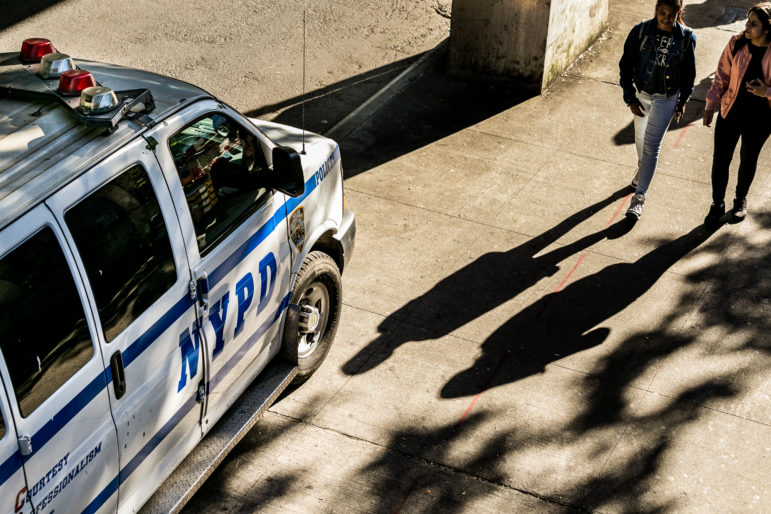‘By personally intervening in discipline decisions as the mood strikes him, Adams will not only undermine the purpose of these rules and standards, he will defeat them, making murky the clear line of accountability that is supposed to adhere between a citizen and a police officer.’

Adi Talwar
Like many New Yorkers, I was amused a few weeks ago by the juxtaposition between Mayor Bill de Blasio’s “get-tough-on-crime” pantomime, featuring the destruction of illegal dirt bikes, and the video posted on social media the following day of a New York Police Department (NYPD) officer, in full uniform, grinning while riding on the back of an illegal dirt bike. Not as amusing however, was the discipline the NYPD meted out to the officer for her illegal ride: a suspension from duty, without pay, for an undisclosed period of time.
This lack of amusement stems, perhaps surprisingly, from the department’s lack of transparency as to the officer’s actual punishment. Rather than impressive, the NYPD’s prompt release to the press about the officer’s discipline only revealed problems with the NYPD’s system of discipline, problems that last year’s repeal of Section 50-a of New York State’s Civil Rights Law (the section that prohibited releasing details about a police officer’s disciplinary record to the public) did nothing to address and of which New York’s next Mayor, Eric Adams, seems either unaware or unconcerned about addressing.
The first problem with the dirt bike-riding officer’s punishment is the punishment itself. In the past 10 months, the exact same punishment—suspension from duty without pay for an undisclosed period of time—has been assessed for the following, wildly disparate, officer misdeeds: telephone harassment; fighting a fellow officer in the precinct; drug selling; assaulting a girlfriend; transporting drugs; sexual harassment of a colleague; failure to respond to a shooting within the officer’s eyesight; and accepting bribes, all offenses involving differing levels of intentionality, harm to the public, violations of citizens’ trust, and breaking of internal NYPD rules, yet all subject to the exact same punishment.
A properly functioning system of police discipline, of which the NYPD’s is not, would be able to distinguish between these differing levels of intent and harm and gradate punishments accordingly (It should be noted that the NYPD has developed a “Discipline Matrix,” which, in fact, does not distinguish between levels, but is simply a list of factors the police commissioner can consider, if he so chooses). The department’s system of discipline, however, does potentially allow for differing levels of suspension: Section 206-07 of the NYPD’s Patrol Guide permits the commissioner “or a uniformed member… in the rank of captain and above” to suspend an officer “when, in their opinion, such action is necessary.” A further section gives a superior officer the power to suspend an officer for up to four weeks.
Thus, an officer’s suspension can be modulated between one and 28 days, if a superior officer wishes to weigh the different levels of intent or harm caused. This capability, however, raises a further problem with the dirt bike-riding officer’s punishment: either the department did not differentiate between the misdeeds of the officers from the list enumerated above or the NYPD simply chooses not to disclose to the public the length of the given suspensions. If the latter, then it must be asked, why does the department refuse to disclose this information? The answer, of course, is because it can.
The department has interpreted the repeal of Section 50-a as covering only discipline resulting from an internal administrative NYPD trial, a reading that means the department does not have to disclose any details regarding summary suspensions handed down under Section 206-07 of the Patrol Guide. One would have thought such a loophole would have been covered by the legislation repealing Section 50-a, but a recent lawsuit filed by the New York Civil Liberties Union, seeking to resolve this exact question, shows that the scope of the repeal of Section 50-a remains in doubt.
Such a quandary could have been avoided if the NYPD, as well as the activists working for repeal of Section 50-a, had adopted an alternative approach towards discipline transparency. Rather than a process solely to expose the misdeeds of officers, transparent discipline is a means by which the department asserts and publicly promotes its values, while aligning its goals with what the citizenry demands. Such an approach would have led, not to a simple repeal of Section 50-a, but to the creation of a system of transparency that could encompass the broad scope of activity by which the NYPD could say, “this is what we stand for.”
New York’s next Mayor, Eric Adams, suffers from a similarly mistaken approach, judging by his recent declamation that he will personally intervene in discipline decisions when he, as mayor, disagrees with the commissioner. The NYPD, as a large bureaucratic organization, is supposed to operate according to a clear set of rules and standards; by personally intervening in discipline decisions as the mood strikes him, Adams will not only undermine the purpose of these rules and standards, he will defeat them, making murky the clear line of accountability that is supposed to adhere between a citizen and a police officer.
Let us hope that, as a former police officer, Adams uses the next few months to reconsider his position; what New Yorkers need and desire from him is a clear and transparent system of police accountability, not more of the current muddle.
Christian Covington is an attorney and a graduate of the CUNY Graduate Center’s master’s program in political science.








